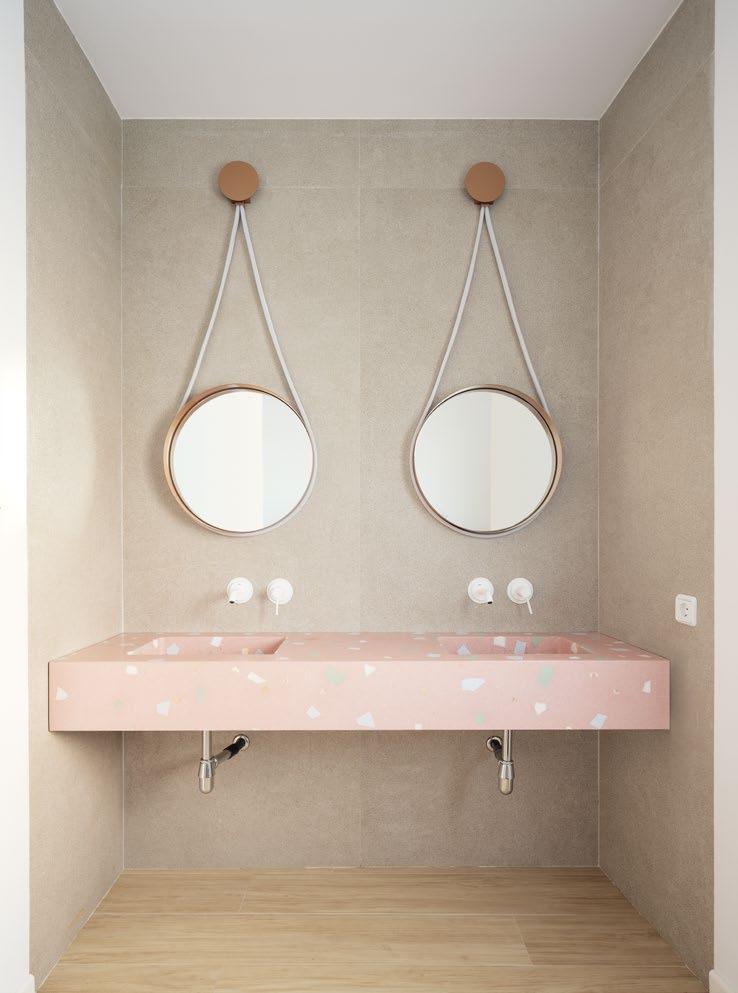
4 minute read
Huguet tiles
When Gabriel Huguet opened his
factory in Campos in 1933, he could never have imagined that its products would become the choice of prestigious international architects and designers and win numerous awards.
Huguet was then one of five factories in the village (and one of around a hundred in Mallorca) making cement-based tiles, sinks, beams, and blocks. With almost no road between Campos and the nearest town of Llucmajor, deliveries were made by cart to local customers. What was made in Campos, stayed in Campos.
The 19th-century British mason Joseph Aspdin’s invention of Portland cement had revolutionized the construction industry. “One spin-off was the hydraulic tile,” says Biel Huguet, the founder’s visionary grandson, who has run the company for the past twentythree years.
From traditional Mallorcan to
striking contemporary designs, these tiles are still handcrafted by artisans today. Cement is mixed with water and an aggregate, coloured as required using natural pigments, poured into the appropriate mould, pressed, and then left to cure. Visitors to Huguet can see this fascinating process in action in the workshop next to the showroom.
Supply couldn’t match the burgeoning demand for tiles for new tourist hotels. Better-paid jobs in the hospitality sector depleted the artisan workforce and Mallorca’s improved infrastructure made it easier to import massproduced ceramic tiles from Valencia.
With their new tourism-generated wealth, many Mallorcans wanted modern materials – such as linoleum, carpets, and aluminium – for their homes. “Most of the traditional factories closed or adapted their portfolio,” Biel says, adding that his father focused on manufacturing beams and blocks.
Studying for his degree in technical
architecture in Barcelona, Biel witnessed a more positive tourism impact: “The large number of Japanese tourists who came for the 1992 Olympic Games paid a lot of attention to Gaudí (who used a lot of cement tiles) and Modernism.” A renewed appreciation for traditional architecture began.
In 1996, a more worldly Biel came home to Campos to take over the family business from his sick father. An elderly man from Huguet’s early years taught him what he remembered about making cement tiles, which was supplemented by Biel’s research and contacts in technical architecture in Barcelona. “We blended traditional and contemporary knowledge.”
Biel says Huguet survived in the late ‘90s because of the foreigners who came to buy homes on the island. “These people appreciated traditional Mallorcan architecture and wanted something authentic.”
In 2019, sustainability is one of Biel’s most important considerations and Huguet is working on accreditation. “My grandfather used sand from Es Trenc beach as an aggregate, but recycled marble dust – waste
Gabriel Huguet
HYDRAULIC TILES MADE IN MALLORCA






from marble slab production – replaced that. And, unlike clay, hydraulic tiles don’t go into a kiln emitting CO2.” These tiles age well and can last more than a century; if ever discarded, they can be recycled as aggregate.
Today, Huguet tiles are in locations including Hong Kong, New Zealand, and in Washington DC’s Jaleo Restaurant – a favourite of the Obamas. Biel smiles when he thinks of the former president walking on his company’s tiles.
As well as bespoke tiles, the Campos factory offers collections by well-known architects and designers, including Carme Pinós, Sybilla, Lluis Clotet, and Alfredo Häberli.
Several award-winning projects
have incorporated Huguet products: Szczecin Philharmonic Hall in Poland won the 2015 Mies Van der Rohe Award and features bespoke Barozzi Veiga Collection tiles, stairs, furniture and washbasins. OHLAB’S MM House in Génova, near Palma de Mallorca, was ‘House of the Year’ in the 2016 World Architecture Festival. The Swiss-based international architects and designers Herzog & De Meuron chose Huguet tiles for the Forum Building in Barcelona (Museum of Natural Sciences). Sóller’s Can Prunera Modernist Museum, luxury lifestyle store Rialto Living, and the 5-star Glòria de Sant Jaume Hotel in Palma are a few locations in Mallorca enhanced by the beautiful tiles.
Awards, extensive press coverage, social media, and exhibiting at the London Design Fair for the past three years have raised awareness. ‘Wallpaper’ magazine approached Seoul-based Teo Yang Studio and Huguet (both winners of ‘Wallpaper’ Design Awards) to create contemporary birdbaths – dedicating two pages of their August 2019 edition to the story. When one of the world’s best-known companies recently wanted bespoke tiles for its head office, they contacted Huguet.
Biel has recovered, updated, and added creativity to traditional cement-based product manufacture. “It’s very important to keep our identity – but offer an updated version to the world.” His interest in architecture makes him open to innovation, allowing Huguet to evolve and extend its product range, which now includes items made from recycled terrazzo. “When I started twenty-three years ago, I was thinking about traditional floor tiles and sinks; now we have the skills, the passion and the willingness to go much further.”
Biel Huguet feels proud to have
maintained the tradition of his family heritage, whilst bringing the company into the 21st century and out to the world. Like E5 Living, Huguet offers quality and a high level of personalized service – which is why their acclaimed hydraulic tiles grace the E5 Palma Old Town homes.

Dornbracht VAIA Create a new balance











